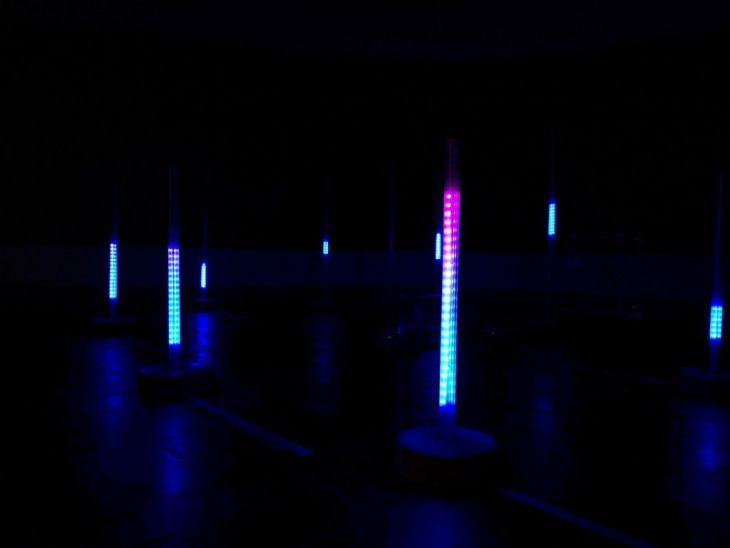Seminar: Studio Supporting Seminar II – Physical Computing
Arduino, Sensors, Pixel Mapping, Environmental data.
Seminar Faculty: Cristian Rizzuti
Total Hours: 20 hours

Seminar Description:
Physical computing means building interactive physical systems through the use of software and hardware that can sense and respond to the analog world.
In this seminar will be explored physical interaction with computational media in real time. The widespread diffusion of sensing, computational, and communicative media into the physical realm presents an opportunity for exploring and constructing intelligent objects understood through dynamic and complex relationships of adaptation and improvisation to the environment, the site, and the human body. The course will chart and explore a range of approaches for integrating computation into the physical realm through a series of projects using physical computing prototyping tools.
Students will design and develop projects that use sensors and microcontrollers like Arduino to translate sensory input to control electro-mechanical devices such as motors, servos, RGB lights or other hardware in real time as well as collect, analyze and use sensed data by connecting their project with the internet. Internet of Things (IoT) technologies are transforming the building industry and have significant potential to improve the indoor environmental quality and energy performance of buildings.
Course Schedule:
Week 1: Friday 11.01.2019 – 17:30 / 19:30 (2 hours)
Overview of Physical Computing and IoT and interactive prototyping.
Installing the Arduino IDE and basic code examples.
Week 2: Wed. 16.01.2019 – 15:00 / 17:00 (2 hours)
Arduino programming, basic soldering.
Week 3: Wed. 23.01.2019 – 15:00 / 17:00 (2 hours)
Environmental sensing – Thermal and light sensors.
Week 4: Wed. 30.01.2019 – 15:00 / 17:00 (2 hours)
Actuator – RGB LEDs, Motor.
Week 5: Wed. 20.02.2019 – 15:00 / 18:00 (3 hours)
Supervised work on final projects
Week 6: Wed. 27.02.2019 – 15:00 / 18:00 (3 hours)
Using environmental data. – Data collection, analysis and visualization.
Week 7: Wed. 06.03.2019 – 15:00 / 18:00 (3 hours)
Making connections, effective workflows and testing
Week 8: Wed. 13.01.2019 – 15:00 / 18:00 (3 hours)
Final working project prototypes
Assignments:
This seminar will be directly connected to the studio Internet of Building for which students will Developing a Physical Model on which they will display through Arduino control-boards the data flows and system of communications that defines a network of buildings
Attendance and participation in class will also affect the grade.
Requirements:
Arduino kit (the students can buy the official one or that one that is cheaper and comes with more parts).
Bibliography
- Massimo Banzi, Make: Getting Started with Arduino: The Open Source Electronics
- Prototyping Platform, 2014
- Simon Monk, Make: Action – Movement, Light, and Sound with Arduino and Raspberry Pi, 2016
- Adam Greenfield, Everyware: New Riders, 2006
- Tom Igoe, Making Things Talk: O’Reilly, 2007.
- Joshua Noble, Programming Interactivity: O’Reilly, 2009.
- Greg Borenstein, Making Things See: 3D vision with Kinect, Processing, Arduino, and MakerBot: O’Reilly, 2012.
- Daniel Shiffman, The Nature of Code: Simulating Natural Systems with Processing, 2012
- Daniel Shiffman, Learning Processing, Second Edition: A Beginner’s Guide to Programming Images, Animation, and Interaction, Morgan Kaufmann, 2015
